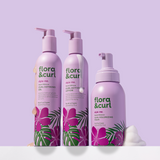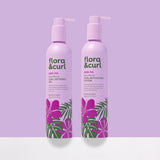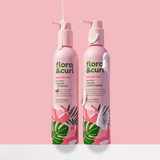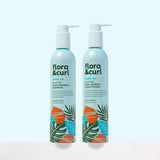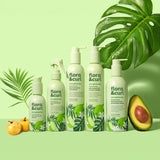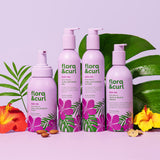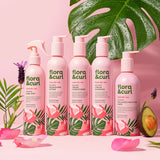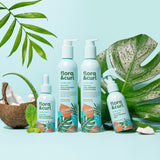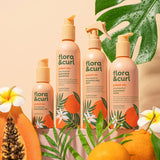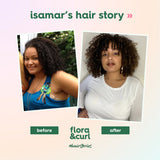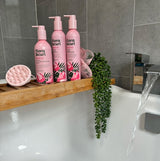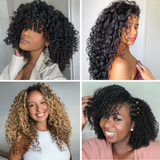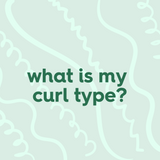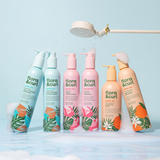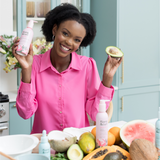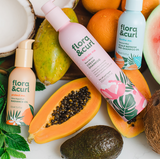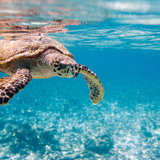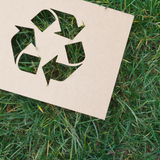

Happy September, curl friends! Although it seems like summer has instantaneously vanished, we've still got until September the 22nd before we enter the season of fall. With that being said, a lot of us have been going on holiday! Whether it'd be a staycation or a full-on vacation to the Bahamas or somewhere idyllic like so - we've definitely been enjoying ourselves!
As we jet, sail or ride off to some of the most beautiful places in the world, it's important to remember that water isn't all the same. For instance, I recently visited Devon in the south of the United Kingdom where the water is a lot harder than in the north. And boy did I notice such a difference to my hair. Unmanageable frizz, constant dryness and my scalp even a little tender and itchy - it was safe to say that the moisture of my hair had just completely gone. Poof, vanished. As soon as I returned I knew that it was time for a reset - but first off, let's take a look at what hard water actually is.
What is hard water?

Hard water is water that contains many minerals that produce a film-like cast or coat on our curls. This cast decreases the penetration of moisture in the hair. As hard water has high concentrations of calcium and magnesium, it was expected that I would notice such a difference. There are other various dissolved minerals in hard water too, such as chlorides, sulphates and carbonates. Where I currently reside, we have soft water and the soft water consists mainly of sodium.
Hard water can be very apparent as it reacts with detergents and soaps by creating excessive soap scum, cloudy watermarks on utensils and the water itself can appear quite cloudy. Another way to find out if you live in a hard water area is to give your hands a rinse. If it feels like there is a film on your hands (a subtle one), it is more than likely that your water is hard.
Signs of hard water on your scalp & curls

Although hard water may be safe to drink, it's not so great for your scalp and curls. Here are some effects from frequent cleansing with hard water:
- Dry and brittle hair
- Lack of shine
- Irritated, itchy scalp
- Dry scalp
- Weakened skin barrier
- Loss of definition and volume
And the list goes on. That's why it is so important for us to restore hydration to our scalp and curls. We've collated 3 solutions to rid the impurities that come with cleansing with hard water.
Solution #1: Clarify

Press reset and encourage a healthy and balanced scalp with mineral-free curls. Clarify your curls every 3-4 weeks.
Solution #2: pH balancing rinse

Apple cider vinegar is a great natural way to lower the hair's pH level. You can add citrus juice and water to the mix to further combat hard water damage.
Key benefits of an ACV rinse
- It helps exfoliate the scalp
- It is loaded with vitamin B & C
- ACV lowers the hair's pH level
- Alleviates dry scalp conditions
How to ACV rinse
- Add 3-4 tablespoons of ACV to a bowl with 1 cup of cool water.
- Cleanse your curls with your favourite F&C shampoo and rinse.
- Pour your ACV mixture over your hair and scalp and now massage for 10-15 minutes.
- Rinse the ACV out of your hair with cool water and condition as you normally would!
- Rinse out your conditioner and style as usual.
Repeat this once every 2-3 weeks if needed.
Solution #3: Deep condition

Use our Rose Water Cream Conditioner for an intensive hydrating deep condition.
Key benefits of the Rose Water Cream Conditioner
- Rose water excellently hydrates.
- Avocado oil replenishes and softens.
- Shea butter nourishes deeply.
- Aloe vera powder infuses even more moisture into your strands.
Repeat this at least 2 times a week if you live in a hard water area. Leave your conditioner on your hair for 15 minutes for better penetration of moisture.
How do you tackle hard water? Whether you live in a hard water area or have been on holiday and noticed the hard water - what key tips do you have for keeping your curls cared for? We'd love to know. Share with us and our curl community in the comments below, alternatively send us an email at social@floracurl.com!
Naturally Yours,
The Team at Flora & Curl
Continue Reading
-
Nov 12th 2025This National Healthy Skin Month, we are highlighting the importance of scalp care and the foundation for healthy curls.
-
Oct 31st 2025
Moisture for Your Curls: How to Keep Your Hair Hydrated & Moisturised
Thirsty curls? Let’s fix that. Here’s your guide to keeping every strand hydrated, healthy, and happy. -
Oct 24th 2025
Protein for Your Curls: Why Protein Matters
Discover why protein matters, and how it strengthens weak curls, exploring Flora & Curl’s Strengthen Me range to repair, protect, and restore y... -
Oct 22nd 2025
Protein vs Moisture: How to Find the Right Balance for Healthy Curls
What is the difference between protein and moisture within your hair care routine? Learn how to tell what your curls need to stay strong, soft, and... -
Sep 25th 2025
Strengthen Me: The Era of Stronger Curls Has Arrived
After three years in the making, it’s finally here! We are proud to announce the launch of our most anticipated collection yet: the Strengthen Me r... -
Apr 13th 2025
How To Enjoy Time At Home During Social Distancing
We understand that periods of uncertainty and information overload can make many people feel uneasy and out of a routine. We’ve rounded up a few wa...

